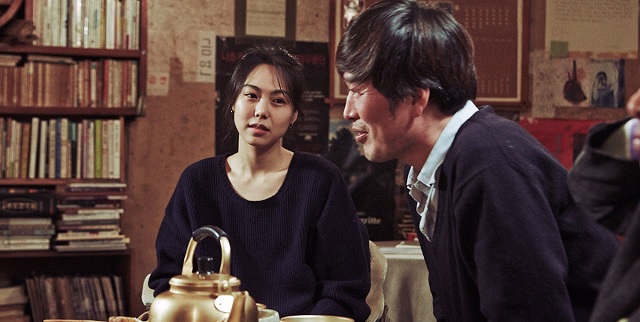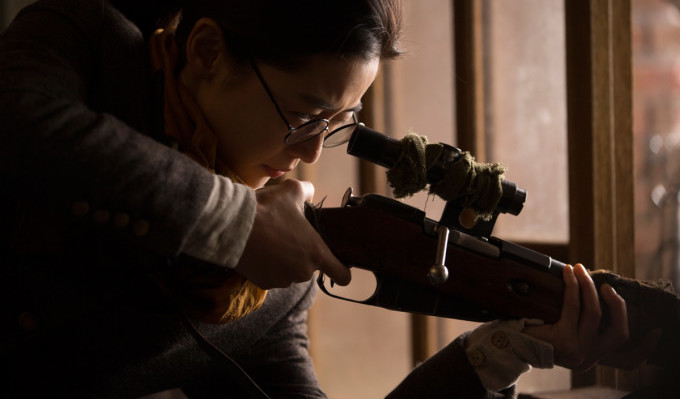Last weekend London proudly hosted the BFI Film Festival and showcased two of its four Korean films to excited audiences.
Tonight’s Film Friday is a BFI Film Festival special as we are reviewing ‘Assassination’ and ‘Right Now, Wrong Then’.
‘Right Now, Wrong Then’ is an expressive tale of the meeting of two strangers and how their initial feelings develop over the course of the day spent together. Director Hong Sang-soo is notorious for creating satisfying realism in his pictures and ‘Right Now, Wrong Then’ doesn’t disappoint. The construct is compelling and simplistic, the characters dynamic and the narration honest and pure.
A film director arrives a day early for the showing of his film at a local film festival. He proceeds to strike up a conversation with a young artist at a historic palace and the two become inseparable for the duration of the day. From an initially awkward conversation about banana milk to a drunken episode at a local sushi joint, the two strangers become objects in a truthful tale of choice and decision.

The film is particularly intriguing as it ends after the first hour and repeats the narrative in the second half of the film with interesting differences. The film begins with the words ‘Right Then, Wrong Now’ and as it replays, the correct title ‘Right Now, Wrong Then’ flashes across the screen introducing the second rendition of the narrative. The film is extremely moving as it solely focuses on the dialogue between the two protagonists. The beauty of this film stems from the raw characterisation and painfully honest dialogue creating a realistic shift between the two stories. The two characters are both entertaining and frustrating. You do feel like reaching into the screen to throttle them in parts… Although they are flawed, they remain refreshingly honest and endearing.
Ultimately, ‘Right Now, Wrong Then’ is a drunken tale of love confessed over a bottle of Soju. It creates a satisfying depiction of realism without the need to embellish with exaggerated dialogue and cinematography. The idea of the story retold a second time is the most appreciative element to the entire film.
—
‘Assassination’ is a wartime epic following the stories of Korean freedom fighters forced to flee to China after the conquest of Korea by Japan in the 1930s. Considered heroes by members of their cause and terrorists by the Japanese, the freedom fighters will stop at nothing to liberate Korea from the rule of Japan, so that they can return to live in their beloved homeland. The protagonist is a female rebel sniper fighting oppression along with her male counterparts as they seek to overthrow the tyrannic reign.

The initial plot is the assassination attempt of a high-ranking Japanese military commander and an opportunistic Korean traitor obsessed with status and wealth. As the main story develops, the director delves into the individual stories of the characters, revealing their motives and pasts. The director captures the evolution of the characters and you can’t help but find their individual quirks both humorous and endearing. The characters are beautifully portrayed and the dialogue perfectly executed and real.
Dong-hoon Choi can’t disguise his admiration for Quentin Tarantino in this latest blockbuster. The influence is clearly evident in the construct of sub-plots and emphasised in the stylistic approach to the cinematography and characterisation. The cinematography is slick and vibrant and the action scenes are expansive and fast paced. The context of the film makes the action scenes integral to the story and they never seem out of place or gratuitous.
This espionage action film indulges in a intriguing slice of Korea’s history and produces a slick, Tarantino-inspired blockbuster that proves to be an epic tale of heroism, betrayal and honour.
The curtain falls on the BFI London Film Festival on Sunday 18th October. It’s been a fantastic showcase of world cinema, especially from Korea. We are already anticipating the return of the festival next year and the return of Korean cinema presented on the big screen to an excited and passionate audience.


![[Film Friday] BFI London Film Festival Special: Assassination & Right Now, Wrong Then](https://unitedkpop.com/wp-content/uploads/2015/10/film_bfi-1.png)
![[Album Review] Stray Kids – 5 Star](https://unitedkpop.com/wp-content/uploads/2023/06/stray-kids-comeback-ruckt-naher-anfang-juni-erscheint-5-star-435751-214x140.jpg)
![[Song of the Week] “S-Class” – Stray Kids](https://unitedkpop.com/wp-content/uploads/2023/06/Fuuswh2X0AAcNWC-214x140.jpg)
![[Song of the Week] Le Sserafim – Fearless](https://unitedkpop.com/wp-content/uploads/2022/05/le-sserafim-hybe-source-music-girl-group-debut-2022-214x140.jpg)